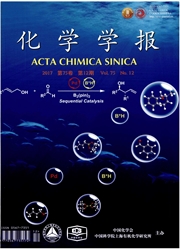

 中文摘要:
中文摘要:
采用原位合成法合成了介孔Cu/HMS催化剂,并以草酸二甲酯催化加氢合成乙二醇为探针反应考察了不同焙烧温度对反应催化性能的影响,结果表明焙烧温度为650℃时合成的催化剂在该反应中表现出最佳的催化性能.在反应温度为200℃、压力为3MPa、氢酯比为50、液时空速为0.74h-1的条件下,草酸二甲酯的转化率达到100%,并且乙二醇的选择性达到97%.采用X射线粉末衍射、N2低温吸附、H2-TPR、N2O滴定、X射线光电子能谱及傅利叶变换红外光谱对系列催化剂进行了系统表征,阐述了焙烧温度对催化性能影响的本质原因.研究表明焙烧温度能够影响活性铜物种的分散度和铜物种与载体间的相互作用,从而影响草酸二甲酯催化加氢的催化性能.
 英文摘要:
英文摘要:
A series of mesoporous Cu-HMS catalysts prepared under different calcination temperatures were synthesized by a deposition precipitation method. The catalytic reaction was tested via the hydrogena- tion of dimethyl oxalate (DMO) to ethylene glycol (EG). The 100% DMO conversion and 97% EG selectiv- ity could be obtained over the optimized catalyst calcined at 650 ℃. XRD, BET, H2-TPR, N20 titration and XPS were used to unveil the intrinsic essence of the catalyst. It was suggested that the dispersion of copper species and the interaction between the copper species and the silica be closely related to the calcination temperature and play a crucial role in the hydrogenation of DMO to EG.
 同期刊论文项目
同期刊论文项目
 同项目期刊论文
同项目期刊论文
 Novel Nanosheet Ag-SiO2-MgO-Al2O3 Material:Preparation, Characterization and Catalytic Application i
Novel Nanosheet Ag-SiO2-MgO-Al2O3 Material:Preparation, Characterization and Catalytic Application i One-Pot Synthesis of Twist-Like Helix W,N-Codoped Titania Photocatalysts with Highly Improved Visibl
One-Pot Synthesis of Twist-Like Helix W,N-Codoped Titania Photocatalysts with Highly Improved Visibl Studies on the structural change of a reaction-controlled phase-transfer [π-C5H5NC16H33]3{PO4[WO3]4}
Studies on the structural change of a reaction-controlled phase-transfer [π-C5H5NC16H33]3{PO4[WO3]4} Study on the transformation of various oxygen species on the surface of electrolytic silver by in si
Study on the transformation of various oxygen species on the surface of electrolytic silver by in si Simple fabrication of twist-like helix N,S-codoped titania photocatalyst with visible-light response
Simple fabrication of twist-like helix N,S-codoped titania photocatalyst with visible-light response Direct Hydro-alcohol Thermal Synthesis of Special Core-shell Structured Fe-doped Titania Microsphere
Direct Hydro-alcohol Thermal Synthesis of Special Core-shell Structured Fe-doped Titania Microsphere A green process for O-hetero-cyclization of cycloocta-1,5-diene by peroxo tungstic species with aque
A green process for O-hetero-cyclization of cycloocta-1,5-diene by peroxo tungstic species with aque High active and selective copper-containing HMS catalyst in the hydrogenation of dimethyl oxalate to
High active and selective copper-containing HMS catalyst in the hydrogenation of dimethyl oxalate to Characterization and catalytic behavior of highly active tungsten-doped SBA-15 catalyst in the synth
Characterization and catalytic behavior of highly active tungsten-doped SBA-15 catalyst in the synth Simple fabrication of thermally stable apertured N-doped TiO2 microtubes as a highly efficient photo
Simple fabrication of thermally stable apertured N-doped TiO2 microtubes as a highly efficient photo Unexpected mononuclear W(VI) complexes containing phosphonate ligands anchored on mesoporous silica.
Unexpected mononuclear W(VI) complexes containing phosphonate ligands anchored on mesoporous silica. Novel Core-Shell Structured Mesoporous Titania Microspheres: Preparation, Characterization and Excel
Novel Core-Shell Structured Mesoporous Titania Microspheres: Preparation, Characterization and Excel Highly efficient tungsten trioxide containing mesocellular silica foam catalyst in the O-heterocycli
Highly efficient tungsten trioxide containing mesocellular silica foam catalyst in the O-heterocycli Formation of Ordered Mesoporous MgO with Tunable Pore Diameter and Its Application As Excellent Alka
Formation of Ordered Mesoporous MgO with Tunable Pore Diameter and Its Application As Excellent Alka Influence of tungsten precursors on the structure and catalytic properties of WO3/SBA-15 in the sele
Influence of tungsten precursors on the structure and catalytic properties of WO3/SBA-15 in the sele Au/TiO2 as high efficient catalyst for the selective oxidative cyclization of 1,4-butanediol to (-bu
Au/TiO2 as high efficient catalyst for the selective oxidative cyclization of 1,4-butanediol to (-bu New green catalytic manufacture of glutaric acid from the oxidation of cyclopentane-1,2-diol with aq
New green catalytic manufacture of glutaric acid from the oxidation of cyclopentane-1,2-diol with aq Self-assembled Mg5(CO3)4(OH)2(4H2O nanosheet as an effective catalyst in the Baeyer-Villiger oxidati
Self-assembled Mg5(CO3)4(OH)2(4H2O nanosheet as an effective catalyst in the Baeyer-Villiger oxidati High-activity, single-site tungsten-containing mesocellular silica foam materials for catalytic epox
High-activity, single-site tungsten-containing mesocellular silica foam materials for catalytic epox Highly active and selective Cs2.5H0.5PW12O40/SBA-15 composite material in the oxidation of cyclopent
Highly active and selective Cs2.5H0.5PW12O40/SBA-15 composite material in the oxidation of cyclopent 期刊信息
期刊信息
